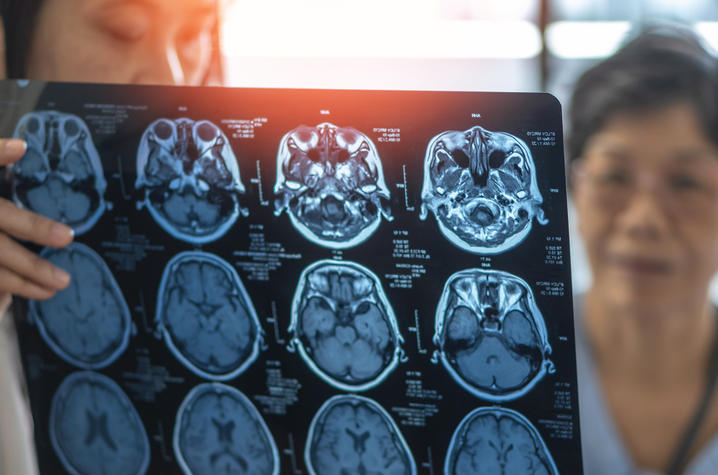Brain cancer awareness: Understanding the signs, risks and treatments

The University of Kentucky Public Relations and Strategic Communications Office provides a weekly health column available for use and reprint by news media. This week’s column is by John Villano, M.D., Ph.D., a medical oncologist at the University of Kentucky Markey Cancer Center.
LEXINGTON, Ky. (May 5, 2025) — Each year, thousands of adults are diagnosed with tumors that form in the brain or spinal cord. These tumors can affect everything from how we move and think to how we feel each day. While not all of them are cancerous, they can still be serious and life-changing.
What are these tumors?
Central nervous system tumors form when abnormal cells grow in the brain or spinal cord. Some start there and are known as primary tumors.
Others spread from cancers in other parts of the body, such as the lungs or breasts. These are called metastatic tumors and are more common in adults.
Some tumors are benign, meaning they grow slowly and usually do not spread. Others are malignant, meaning they are cancerous and more likely to grow quickly and invade nearby tissue.
There are many different types of tumors, such as:
- Glioblastomas, which are aggressive and fast-growing
- Astrocytomas, which develop from star-shaped cells called astrocytes and range from slow-growing (grades 1-2) to highly aggressive (grade 4)
- Oligodendrogliomas, which form from cells that make the fatty covering of nerves and often grow slowly
- Meningiomas, which form in the lining of the brain and spinal cord
- Ependymomas, found in areas that hold spinal fluid, often in spine or base of brain
- Medulloblastomas, common in children but also seen in adolescent and young adults.
Symptoms and diagnosis
Tumor symptoms depend on the tumor’s location and size. Some common signs include:
- Headaches, often worse in the morning
- Seizures
- Vision or hearing problems
- Trouble with balance or walking
- Personality or mood changes
- Nausea and vomiting
- Weakness in parts of the body
If a tumor is in the spinal cord, a person might notice back pain, tingling, numbness or difficulty using the bathroom.
To figure out what the patient is dealing with, doctors may use imaging tests like an MRI or CT scan. A biopsy, where a small sample of tissue is taken, helps confirm what type of tumor it is and how it behaves.
Treatment and care
Treatment depends on the tumor’s type, size and location. Common options include:
- Surgery to remove the tumor
- Radiation therapy to shrink or kill tumor cells
- Chemotherapy to target cancer throughout the body
- Targeted therapies that attack specific tumor features
- Supportive care to ease symptoms and improve quality of life
Some slow-growing tumors can be monitored through regular check-ups before treatment is needed. New options like immunotherapy and proton therapy are also being explored through clinical trials.
Staying informed and moving forward
There is still much to learn about why these tumors form. Some risk factors include exposure to certain chemicals, inherited conditions and weakened immune systems.
Follow-up care is a crucial part of the journey. Even if a tumor is successfully treated, it can sometimes return. That’s why regular scans and check-ins with doctors remain important.
Understanding brain and spinal cord tumors is the first step toward early detection and better outcomes. If you have concerns or notice any symptoms, talk to a health care provider.
UK HealthCare is the hospitals and clinics of the University of Kentucky. But it is so much more. It is more than 10,000 dedicated health care professionals committed to providing advanced subspecialty care for the most critically injured and ill patients from the Commonwealth and beyond. It also is the home of the state’s only National Cancer Institute (NCI)-designated Comprehensive Cancer Center, a Level IV Neonatal Intensive Care Unit that cares for the tiniest and sickest newborns and the region’s only Level 1 trauma center.
As an academic research institution, we are continuously pursuing the next generation of cures, treatments, protocols and policies. Our discoveries have the potential to change what’s medically possible within our lifetimes. Our educators and thought leaders are transforming the health care landscape as our six health professions colleges teach the next generation of doctors, nurses, pharmacists and other health care professionals, spreading the highest standards of care. UK HealthCare is the power of advanced medicine committed to creating a healthier Kentucky, now and for generations to come.




